Kategorie: ‘Internship’
My Internship at Bosch Cooperation in Tranås
- Chemical Engineering M.Sc.
- Sweden, Tranås
- Bosch Cooperation
- 03/2024 – 08/2024
Application & Finding an Internship
A fellow student told me about her internship at a company in Tranås, Sweden. There, the company develops and researches all kinds of heat pumps, utilizing power from the mountain, the water, or the air. On the company website, I found several open positions in different departments starting in spring 2024. I applied for a few positions and quickly received their answers. After 2 interviews, I got the internship position in the engineering department, which is working on the reliability of the components in the refrigerant circuit of the heat pump.
Accomodation & Living Expenses
The company is located in Tranås, a small city in the prince Småland in Sweden. I was accommodated with other international interns and thesis students in a hotel directly next to the lake Sommen. Every intern had their own private room and bathroom.The living room, kitchen, Office and laundry room was shared with the other interns. There was also a gym and sauna in the hotel, which we were allowed to use. It took about 10 minutes to drive from the hotel to the city center of Tranås and about 15 minutes to the company. We were provided with 2 cars and 1 van for us interns to drive to work, grocery shopping and other activities. It was also possible to rent company bikes, which was especially nice in the summer.
The provision of accommodation and cars simplified the preparation for the internship a lot, because I didn’t had to look for apartments abroad. Living with 13 other international interns and students, it was easy to settle in and find friends. I really enjoyed living with so many people from different countries and cultures. We often cooked dinner together and spent the evenings on the terrace enjoying the sunset over the lake together.
Everyday Life & The Internship
For my internship contract I had to work 40 hours per week, usually from 7:30 am in the morning until 4:30 pm in the afternoon with a 1-hour lunchbreak. The interns were allowed to work flexible hours and arrange their working hours themselves. During my time at the company, I worked with my supervisor on 3 big, different topics. I was able to get deep into the different topics, apply my knowledge from university and get some work experience.
The working culture in Sweden is non-hierarchical. Everyone is approached just with their first name, regardless of their title, age or status in the company. This is also reflected in the casual dress code at the office. Managers and workers are both working in comfortable and convenient clothing like jeans and sweatshirts. It is also worth mentioning that the Swedes have a very high sense of duty and connection towards their work, their team and the company. Therefore, they are often proudly wearing clothing with the company logo. Important decisions are not only made by senior managers or executives, but everyone on their team is also included in the decision and asked on their opinion on the subject matter. As an intern I felt as part of the team since my first day at work and my opinion was valued and not less worth than from other colleagues. The Swedish way of working is characterized by trust, independence and flexibility of the employes. You are able to organize your workday as you prefer, whether you want to work from your desk, a meeting room or from home.
A very important part of the Swedish work culture is the Swedish coffee break called “Fika”. At least once per day you get yourself a coffee, tea or hot chocolate and sit down with your colleagues on the couch and talk about non work-related topics. Usually someone brings some baked goods with them to share and enjoy during Fika. There is a huge variety of different swedish pastries, like the famous Kanelbullar, Wienerbröd, Chokladbollar and Blabärspaj. I was not surprised, when learned that Sweden is one of the countries that consumes the most amount of coffee per person.
People in Sweden value their work life balance a lot. During lunch time I could go to free Yoga classes, go for a quick session at the companys gym or join one of the running groups.
My colleagues at work were from a lot of different countries, so I talked Englisch most of the time during my internship. Since I shared my accommodation with other interns from all over Europe, I was able to learn some phrases in French, Italian, Swedish and Portuguese.
Free time & Tips
Summer is the best season to for a visit in Sweden, since the amazing Swedish nature with all the beautiful lakes and woods is coming alive. In Sweden, there is the so called “Allemansrätt”, which guarantees you free access to all parts of nature. You are allowed to visit ever dock on the lake, collect as much berries or mushrooms as you want and put up your tent on every island or wood as long as you don’t bother the owner. Everywhere in Sweden you can find amazing hiking trails through fairytale woods with shelters and fireplaces for camping. Even though the summers in Sweden are not as warm, you can easily go swimming in one of the many beautiful and peaceful swimming lakes.
On the weekends I often visited one of the citys around Tranås. I really enjoyed my trip to the small town Gränna, where the sugar cane was invented and stroll past all the candy shops with all the colorful candys displayed. I spend a few sunny afternoons sitting in small cafes in Eksjö surrounded by old pastel colored timber houses. But also, bigger citys like Linköping with the medieval cathedral and Jönköping at the lake Vättern are definitely worth a visit.
From Tranås, you can travel to Stockoholm in 3-4 hours by using the train. I had a lot of fun walking around the old part of the town “Gamla Stan”, visiting the famous Vasa Museum and going for a night out in big city like Stockholm.
Gothenburg is known for its archipelago, several scattered islands on the west coast of Sweden. I had a marvelous time while driving with ferries from island to island. On one of the islands, we rented a kajak and paddled along the coastline for a few hours, of course with a few stops for Fika and a swim in the sea. In the evenings, we visited different bars and listened to swedish metal and rock music.
One of my highlight during my time in Sweden was my canoe trip on the lake Ansen. We rented a canoe for a few days at one of the several canoe rentals. We drove through the national park, enjoyed the beautiful nature and stopped on one of the many islands to build up the tent and sleep for the night. I can highly recommend renting a canoe or kajak and going onto the lake, even just for a few hours.
Another one of my highlights was our trip to the island Öland during Midsommar, the national holiday at the summer solstice. At Midsommar everyone is celebrating all day wearing flower crowns in their hair and dancing around a tree, decorated with flowers and leaves. Since it’s the longest day in the whole and it’s not getting dark, you stay up late and party all night.
Conclusion
I spent a fantastic and wonderful summer during my internship in Sweden, experiencing the incredible nature and landscapes. All the Swedes I met were open-minded, super friendly and made me feel very welcome. The work ethic and culture is much more relaxed than in Germany and you meet your colleagues at eye level, regardless of their hierarchical level and enjoy a coffee and cake during Fika. I am thankful for all the beautiful experiences, memories and new friends I made during my time in Sweden.
My Internship at the University College Dublin
- Molecular and Applied Biotechnology M.Sc.
- Irland, Dublin
- University College Dublin
- 04/2024 – 06/2024
Finding and Applying to an Internship
Before my stay abroad, I wasn’t sure where I wanted to go or what I wanted to do. However, when my girlfriend told me she was offered an internship position at a school in Dublin, my decision became clear. We decided that experiencing our internships abroad in the same city would make things easier, so I started searching for research groups in Dublin that interested me. I explored the websites of known universities, searching for researchers focused on bioprocessing, bioeconomy, and microbiology. I was particularly drawn to one research group, which aimed to utilize microalgae for the valorization of food waste. I directly applied for a three-month research internship, and after a few weeks and two Zoom calls, I was told that I could do the internship.
Accomodation and Living Expenses
Securing an affordable place to stay in Dublin was challenging. The city has a housing crisis, making flats very expensive. Student accommodations on the UCD campus were not a cheaper option, with the lowest price being 800 Euros per month for a shared room, and their application timeframes didn’t fit my schedule. Fortunately, I found a room in a shared apartment for 850 Euros per month on the website “Homestay”. At the start I was feeling very unaccustomed to living with a stranger but that feeling faded away with time when I got to know my flatmate better. The commute to the university was about 30 minutes, and a trip to the city centre took an hour. Despite living outside the city, I enjoyed the greenery, particularly Fernhill Park, which became one of my favorite spots in Dublin.
I usually did my grocery shopping after work once a week, as the smaller stores near my apartment were quite expensive. For example, cheese could cost up to 5 Euros per pack. Bulk shopping at a discount market was essential for affordable food, except for bread, which was inexpensive everywhere but of course not comparable to German bread 😉. I definitely recommend to only shop in large discounter markets in Ireland.
Everyday Live
I felt a bit nervous on my first day, but that quickly faded as I got to know the welcoming members of my research group. The lab environment and research methods were similar to those I was familiar with in Germany, which helped me settle in. Although the general approach was familiar, I still learned new laboratory techniques and tricks from my supervisor, especially regarding sterile work.
My tasks were divided between data analysis of existing literature and practical laboratory work with microalgae, known as wet-, reproducible outcomes. While there are standard practices, each lab has its own tricks lab or bench work. Working with microorganisms requires strict sterile conditions to prevent contamination and ensure predictable to maintain sterility, and I was grateful to learn new methods that were unfamiliar to me from my previous experience in German labs.
One aspect I appreciated about my work was the independence I had in deciding when and how to approach my tasks. Academics often start work later than usual, and this seemed even more common in Ireland. I typically worked from 9:30 am to 5 pm, but some colleagues started later and stayed longer.
In the evenings, I didn’t do much besides going for walks and cooking dinner, with leftovers serving as lunch the next day. Without a bike and with limited bus service in my area, my options for activities were slim. However, I eagerly looked forward to the weekends when I could explore more of Dublin and Ireland.
Free Time and Tips
Although my work group was friendly, social interactions outside work were limited to a monthly movie night. Luckily, I was part of a group of interns from the school where my girlfriend worked. Together, we made the most of our weekends by exploring Dublin’s pubs, restaurants, hiking trails, sightseeing spots, and local markets and art scenes.
Ireland’s pub culture is something special. On weekends, it’s common to go out, have a few pints, and dine at restaurants. Everyone is relaxed and enjoying the weekend atmosphere. Most pubs have live music, and the crowd cheers and sings along, creating a sense of unity and merriment that I have yet to experience in Germany. I personally loved the more traditional “Porterhouse” in the temple bar quarter but also the modern “bonobos” where tabletop games were played and who had a wide variety of all sorts of drinks. Dublin’s culinary scene is also diverse. I enjoyed Indian, Thai, Vietnamese, Spanish, and occasionally Irish food.
Apart from the bustling city, I loved Ireland’s nature the most. Green hills and meadows are everywhere, often contrasted by steep cliffs overlooking the sea. I often visited the peninsula of Howth, close to Dublin, taking all my visitors there because it is a must see for everyone visiting Dublin. It is a 50-minute bus ride from Dublin city center, but only 30 minutes from my girlfriend’s place, where I stayed most weekends. Two highlights at the end of my stay were trips to Galway and Belfast, where I experienced other cities in (Northern) Ireland and took a bus tour along the coast, where I could again awe the nature and the rougher northern coast line. When traveling Ireland, I would recommend taking the train if possible. Train tickets between the big cities cost only 8 Euros and the trains are very clean and spacious making the ride very pleasant. The best thing is: while driving you can view the beautiful landscape.
Conclusion
All in all I can say my internship in Dublin was a remarkable experience, both professionally and personally. I gained research skills, made new friends and could experience the culture of Ireland first hand for 3 month. Especially living and working in a foreign country is an experience that is hard to come by easer than with an Erasmus internship. I am happy I could have that experience and I am sure I will never forget it.
My Internship at the Manuscriptorium in Czechia
- Philosophy, Literary and Linguistic Studies B.A.
- Czechia, Prague
- Manuscriptorium Digital Library of Written Cultural Heritage
- 06/2025-07/2025
Application
I heard about the internship opportunity at the Manuscriptorium (part of the National Library in Prague) from an online article I read. I applied online and after a short period of time they agreed to let me do the internship in Prague. I applied for the Erasmus internship support with the help of RWTH. After filling out the forms I received the confirmation shortly after. The whole process was easy and straightforward.
Accommodation
Finding accommodation in Prague is very difficult and the prices have risen over the years. The locals in Prague told me that finding a flat is even difficult for them. I got a small furnished room in a shared flat with five other people who were also mostly international students. My room was close to the city centre, and I paid 15900 Kč (~640€). For other students I recommend getting a room further away from the centre and looking through Facebook. The public transport in Prague is cheap and amazing, especially the trams and the metro. I paid around 20€ a month and could use every tram, metro, bus and train inside the centre and the surrounding area.
Everyday life in Prague and tips for other students
I really enjoyed living in Prague as it is a very beautiful and big city so there is always something to do. I tried learning some Czech, but it is very difficult and since I only spend two months in Prague and the language at my internship was English, I only learned a few words and sentences.
During the first weeks I often visited the famous tourists’ spots like the Prague castle or the Charles bridge. There are also a lot of beautiful churches that I visited, however in Prague you often must pay to go inside them. Since the city is so beautiful and has a lot of amazing architecture, I also often just walked through the city looking at the buildings. I also met some Czech students that I went climbing with or went to the cinema or the bar. I also visited a lot of exhibitions. In my time in Prague, I went to the Mucha and the Kafka Museum and saw a David Lynch exhibition as well as one focusing on women artists throughout the ages. Surrounding Prague is also a lot of nice nature. I went to Divoká Šárka, which is a nature reserve with a big lake that was perfect for swimming. There is a website called goout.net that I would recommend to all students going to Czechia, it shows concerts, museums, parties and many other events happening in Czechia, but it is also available for Slovakia and Poland.
I also went to some tea rooms that are very cozy and nice if you enjoy freshly brewed tea. In Prague there were also many bistros. Many of these are affordable (the price is calculated based on the weight of your meal) and offer vegan/vegetarian food. Because I am vegetarian I ate at these places a lot. Since Czech food is often made with meat, I could not try a lot of it but there is a meal called Smažený sýr which is fried cheese and fries and tastes nice. Many places also sell homemade lemonades that I can highly recommend, the one I liked the most is Malinovka, which is raspberry flavoured.
Work
I really enjoyed working at the National Library which is inside a beautiful building near the Charles bridge. It was my job to help catalogue medieval manuscripts with XML according to the TEI guidelines and prepare the files for publishing. For this I was first given a good introduction into XML and the cataloguing of medieval manuscripts. I would then start by doing a rough draft for each manuscript and then refining the files multiple times, adding more information about the manuscript and fixing mistakes. The people working at the library were very nice and helpful.
As well as the cataloguing I helped by popularizing the manuscripts by writing articles about them. I really liked the internship since I got to learn XML as well as the TEI-Guidelines which are often used in digital humanities projects. I also enjoyed that I got to learn about medieval manuscripts in the process, since I am very interested in history.
Conclusion
I really enjoyed my time in Prague and met a lot of amazing people. I was a bit nervous at first about going away, however it was a good time, and I would like to experience something like this again. The city is beautiful, and I appreciate that I got to do the internship and learn new skills.
My Internship in Cork, Ireland
- Electrical Engineering and Information Technology M.Sc.
- Ireland, Cork
- QT Technologies Ireland Limited
- 03/2025-07/2025
As a master’s student in Electrical Engineering at RWTH Aachen University, I had the opportunity to complete a six-month internship at Qualcomm in Cork, Ireland, supported by the Erasmus+ Internship Programme. My goal was to gain practical experience in my field while improving my language skills and experiencing life abroad.
1. Application/Finding an internship
I did not specifically look for an internship in Ireland at the beginning. My main aim was to complete an internship during my master’s studies in a country where English or Spanish is spoken, so I could improve one of these languages. Going abroad was a priority for me. I had heard great things about Ireland from two friends who had previously lived and worked there for half a year, so Ireland quickly became a strong option.
I applied directly via the Qualcomm careers website for an internship position in their Cork office. After completing several interviews, I was fortunate to be offered a place.
2. Accommodation & Living expenses
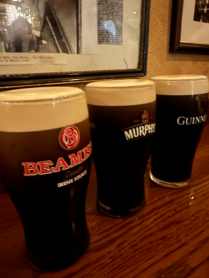
Different Irish stouts: Beamish and Murphy’s from Cork, and Guinness from Dublin.
©Niklas Groß
Shortly after receiving my internship offer, I began searching for accommodation. I was surprised to find that rental prices in Cork were quite high, especially considering the condition and furnishing standards of many of the available options. Fortunately, I was later informed that the company provides shared housing specifically for interns. I was able to rent a furnished 12 sqm room with a private bathroom in a four-person shared house located very close to the city centre. The house included a shared living room, guest toilet, and communal kitchen. The rent was €1000 per month – a flat rate that, as I understood, applied to all interns living in company-provided housing.
Grocery prices were similar to those in Germany. However, prices for personal care products were significantly higher, and alcoholic beverages in supermarkets were extremely expensive. Prices in pubs for a pint of beer ranged between €4.40 and €6.70 – quite steep, though not unheard of compared to places like Cologne. Eating out at restaurants was only slightly more expensive than in Germany.
For baked goods, Lidl offered a self-service bakery section very similar to the ones in Germany, with comparable prices. If you’re looking for high-quality bread, the English Market in Cork is a good place to go – though the prices there are significantly higher.
3. Everyday life/The internship
During my internship, I worked 37.5 hours per week as a Timing Engineer at the company. The office had a very international environment, with interns and colleagues from all over the world. This made for a dynamic and collaborative workplace, where English was the primary working language.
Although I’m unable to go into detail about my specific responsibilities due to confidentiality agreements, I can say that the experience significantly strengthened my technical and analytical skills. I also had the opportunity to work with state-of-the-art tools and contribute to real-world projects within a professional R&D environment.
Regular meetings with my supervisor ensured that I received consistent guidance and feedback, and I always felt well supported by my team. In addition, Qualcomm offered internal learning opportunities such as tech talks and knowledge-sharing sessions, which broadened my perspective on current trends and technologies in the industry.
The office was located within walking distance of the city centre, which made commuting very convenient. I had heard from many others that buses could be unreliable, but since I didn’t rely on them, I can’t confirm this personally.
4. Free time/Tips
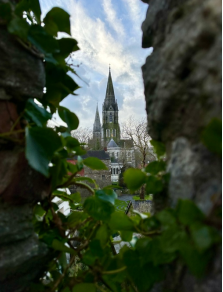
Elizabeth Fort, Saint Fin Barre’s Cathedral, Cork.
©Niklas Groß
Cork is a relatively small city, so you can explore most of the main sights in just a few days. Highlights within the city include Elizabeth Fort, Saint Fin Barre’s Cathedral, the University College Cork (UCC) campus, and the historic Cork City Gaol. A highly recommended walk leads from the city centre to Blackrock Castle, along a newly developed riverside promenade. On the way there or back, it’s definitely worth stopping by the Marina Market, a large indoor street food hall offering international cuisine and a lively atmosphere.
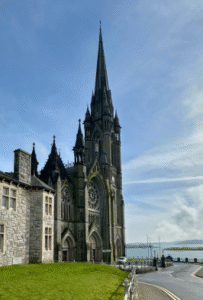
St Colman’s Cathedral, Cobh.
©Niklas Groß
Cork also boasts a vibrant and active pub scene, with events such as pub quizzes, live music – from traditional Irish tunes to international classics – beer pong tournaments, and more. Especially on weekends, there’s always something happening.
When the weather is good, relaxing outdoors is easy. In addition to Fitzgerald Park, Cork Lough and St. Patrick’s Hill are great spots to lie on the grass and enjoy the sunshine.
For short trips just outside of Cork, the harbour towns of Kinsale (about 1 hour by bus) and Cobh (25 minutes by train) are highly recommended. Both offer beautiful coastal views and a pleasant atmosphere for day trips.
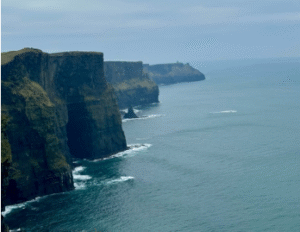
The stunning Cliffs of Moher on Ireland’s west coast.
©Niklas Groß
There’s also a WhatsApp group and Instagram page (corkinternationalstudents) specifically for international students. These platforms help organize a variety of events in the city, such as parties, pub crawls, karaoke nights, and more. They also arrange affordable tours to Irish landmarks like the Cliffs of Moher, cities such as Dublin or Galway, and scenic hikes to places like the Ring of Kerry or Coumshingaun Lough. The people involved are very welcoming, and it’s a great way to make new friends – including students from UCC.
Another cultural highlight is attending a match at the GAA stadium to cheer for Cork in traditional Irish sports like Hurling and Gaelic Football. When Cork reached the provincial finals and even the All-Ireland semi-final and final in Hurling, the whole city came alive with celebration and watch parties.
If you’re a fan of other sports, you can also catch international football matches at pubs like The Woolshed, which even streams the German Bundesliga – perfect if you want to see Borussia Dortmund win a match!
5. Conclusion
I truly enjoyed my time in Ireland. I had the chance to meet many friendly and inspiring people and gained valuable professional experience. Following my internship, I’ll be moving back to Cork to work full-time for the same company. This internship was an incredibly rewarding experience both personally and professionally.
My Internship at Axelera AI in Leuven
- Electrical Engineering, Information Technology and Computer Engineering M.Sc.
- Belgium, Leuven
- Axelera AI N.V.
- 11/2024 – 04/2025
1 Application
I discovered the internship posting on LinkedIn and applied via the official Axelera careers page in late July 2024. A few days later, I had a first screening call with the hiring manager who would be supervising my internship. Next there were two longer technical interviews to assess my abilities in software and hardware development. Finally, an executive interview with the team manager and an HR interview about cultural fit and compensation, respectively, concluded the process by late August. As soon as I had received the signed work contract, I applied for Erasmus internship support from RWTH, which required some more forms and signatures.
2 Accommodation
Leuven is a student town, owing to the presence of KU Leuven. This is Belgium’s largest university by number of enrolled students. For this reason, both studios and shared flats are widespread throughout the city, but nevertheless highly sought after.
A surprising number of accommodations is advertised and rented through Facebook, which was also how I eventually found the place I stayed at. It was a room in a shared house, within walking distance of the train station and my workplace. Like most rental contracts, mine had a fixed duration of one year, with a fee for early termination that I had to pay since I left earlier. The room also came furnished, so I could move to Leuven comfortably by train from Aachen, bringing just clothing, my bike and other personal items.
3 Costs
The rent was €520 with all amenities included, which was a fairly average market rate based on my impression. Overall, housing seemed to be slightly more expensive than in Aachen, especially for studio apartments where rent could reach €1000+.
In general, most items and services seemed to cost approximately 20% more than one might be used to from Germany. This becomes apparent at restaurants, but also for groceries and other everyday purchases.
One notable exception to the higher prices is train travel. A youth ticket for any route inside Belgium with any SNCB train costs about €8 regardless of time or distance, and can become even cheaper if bought in bulk or when traveling during the weekend. Furthermore, Belgian trains are very rarely delayed.
4 Work
The project I would complete during my internship was already outlined in the job description. Its main goal was to develop a compressor block in hardware that would reduce the amount of intermediate data to be transferred inside the Axelera AI processing unit during inference. Ultimately, this would enable higher energy efficiency and performance at the cost of slightly increased chip area and complexity.
My project was structured in the phases of algorithm research in the scientific literature, prototyping of promising algorithms in Python, and finally implementation of one or more algorithms in Verilog for integration within the DMA unit.
Even though Axelera generally allows remote work, the internship contract required 100% time in the office. This facilitated deeper connection and better knowledge exchange with my colleagues, and was easily doable for me with a 10-minute walking commute.
While several employees in the System Architecture team were located in Leuven, my direct manager was based in Zurich. To enable better collaboration, we strived to meet physically once per month. Sometimes, she came to Leuven, but I also traveled to Zurich on several occasions for one week at a time. All travel expenses were covered by Axelera.
5 Everyday Life
Leuven is located in Flanders, the Dutch-speaking part of Belgium. To blend in better with everyday life, I decided to learn Dutch and reached B1 level. Reading and writing is relatively easy as German native speaker, while speaking and listening may be slightly more difficult. I attended courses at CLT, a language school affiliated with KU Leuven. These courses took place twice a week in the evening, and the classroom was easily reachable on foot. On other days, I went to a nearby gym and joined the local running club.
Supermarkets close earlier in Leuven compared to Germany, which meant that I mostly had to do groceries on Saturdays. This also applied to other time-intensive activities, such as travel.
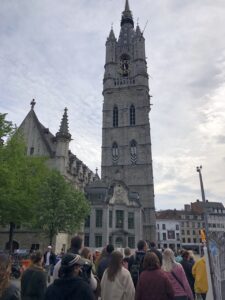
Belfry in Ghent
©Thorben Fetz
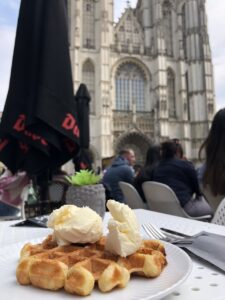
Liège Waffle
©Thorben Fetz
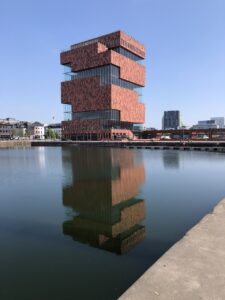
MAS in Antwerp
©Thorben Fetz
Taking advantage of the aforementioned very affordable train tickets, I visited most larger Belgian cities during weekends. Brussels is just 20 minutes away, but also Li`ege, Mechelen, Antwerp, Ghent or Bruges can be reached with direct connections. Even going to the seaside in Ostend takes less than 2 hours.
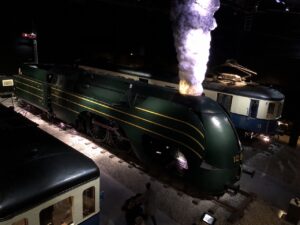
Train World
©Thorben Fetz
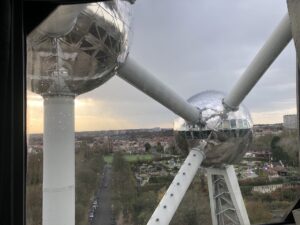
Inside the Atomium
©Thorben Fetz
Some other attractions I visited include TrainWorld in Schaerbeek and the Atomium in Brussels. Many museums offer discounted entry for students.
6 Conclusion
Overall, I am very grateful for the opportunity of conducting my internship at Axelera AI in Leuven. The experience has been invaluable, allowing me to develop both technical skills in algorithm and hardware design, as well as soft skills through international collaboration. Living in Belgium broadened my cultural horizons, while learning Dutch facilitated daily interactions.
The Erasmus funding was welcome in making this experience possible, covering relocation costs and a portion of the living expenses. This support allowed me to focus fully on my professional development and cultural immersion.
My Internship in Athens
- Engineering Geohazards M.Sc.
- Greece, Athens
- Agricultural University of Athens
- 03/2025 – 06/2025
When I first decided, that I wanted to spend some months during my studies in Greece, I was very overwhelmed with the organisation. Luckily, throughout my academic career I was able to already make some contacts to academic staff at Agricultural University in Athens. These people were very willing to host me as an intern in their department for a few months. Hence, I was lucky in finding an internship place relatively fast.
The next challenge then was to find accommodation. I did not know what I was looking for really. I only knew that I definitely did not want to live on my own but in a shared flat, to be able to make new contacts and friends quickly. Most online resources and friends of mine who had already lived in Greece longerterm, suggested to check Facebook groups to find listings of rooms in shared apartments. Whilst this was a good suggestion and I also contacted some of the listings, I kept being fearful of scams. I had heard a lot about scamming in Greece (which to this day, I have never experienced myself. Probably, this is only a bad stereotype of the Greek). This is why I then opted for renting a room through the platform ‘Housinganywhere’. I was very lucky in finding a room in a shared apartment in a very central location (Exarchia). When I moved in, I was very excited to meet my flatmates because I had no idea who I would be living with for the next three months. However, I was very lucky to be sharing the apartment with a 25 year old German and a 23 year old Romanian. We quickly became friends and explored our new home together.
I had previously been to Greece either for vacation or for work trips several times and always perceived the living expenses to be incredibly low. However, I must withdraw this statement. Now, that I have spent so much time in Athens, I must say that living expenses are nearly equal to those in Germany (Aachen). Whilst some produce like fresh fruit and vegetables or public transport were shockingly cheap, other expenses like rent, groceries, toiletries etc. were just as expensive as they are in Germany. Obviously, Athens as a large town and the capital of Greece, is rather expensive in comparison to other Greek cities. However, this left me wondering, how the typical Greek person can manage to live in Athens with the normal Greek salary.
My everyday-life in Athens was mostly dominated by the 40 hours per week that I spent inside the university working. Whilst I got to know many other Erasmus students and other Internationals, I was mostly surrounded by Greek people at work. I felt this to be a very enriching experience since I was able to learn a lot about the Greek mentality, lifestyle and mindset only through my working hours. Outside my work, I spent most of my time with other international student and/or my flatmates. Together, we tried to navigate life in Athens without getting lost in this busy city. In our free time, we naturally spent most of our time outside, in parks or on the beach. Living so close to the sea and being able to spontaneously decide to go swim in the ocean felt like a huge privilege to me.
Additionally, I tried to explore as much of Greece outside of Athens as I could. Through a thousand different options of transportation – busses, trains, trams, metros, rental cars, … – I was able to explore many remote areas as well as urban areas within Greece. These included Kalamata, Gerolimenas, Methoni, Glyfada, Korinth, Koroni and many more. In addition to that, I also really fell in love with the ancient history of Greece and spent time visiting archaeological sites like the Akrokorinth or the Delphi oracle and also the monasteries of Meteora.
If I could, I would advise everyone who thinks about spending time abroad, to consider choosing Greece. Whilst the language might seem difficult and the life in Greece seems to be busy and chaotic, it is also an incredibly beautiful country full of lovely people, delicious food, rich history, beautiful landscapes – and of course many cute cats. I have felt very welcome wherever I went in Greece, with numerous Greeks being able to even speak some German to me. The Greek people were always happy to include me in their culture and life, introduce me to their local food and traditions and make me feel at home.
My Internship at a Geotourism Company on the Island of Ischia
- Applied Geography B.Sc.
- Italy, Ischia
- Eurogeopark
- 04/2025 – 06/2025
Application / Search for an Internship
In February, I was faced with the task of finding an internship for my bachelor’s degree. I wanted to do something exciting and varied – preferably nothing that took place solely in an office. So I searched the internet and came across an advertisement for a ‘GEO internship on the island of Ischia’ from the company Eurogeopark. My interest was immediately piqued: a green island in the Mediterranean, just off the coast of Naples, geological hiking tours on volcanic, geological and botanical topics – and all of this for three months in Italy. I was immediately convinced. I applied directly via the email address provided with the required documents and received confirmation of the internship starting on 1 April on the same day. However, before I could get started, I had a few things to organize: the university had to recognize the internship abroad, I applied to Erasmus+ for financial support, looked for accommodation and planned my journey.
In the end, I decided to travel by train. A few days before I was due to start, I packed my things and travelled via Zurich – with an overnight stay – to Naples, from where I took the ferry to my destination island: Ischia.
Accommodation & Living Expenses

Ischia ©Gefion Bardenz
Eurogeopark did not provide me with accommodation, so I initially looked for a flat myself – which proved difficult. Three months is too long for holiday flats, but too short for regular rental contracts. Finally, I turned to my boss, who put me in touch with someone locally. I found a great flat in Ischia Porto, only about a 20-minute walk from the harbor and center of the city.
The flat was large – almost too large for one person – but it was perfect for entertaining guests. It had two bedrooms, a bathroom, a dining/living room, a kitchen, a balcony and was equipped with everything I needed: stove, oven, pots, dishes, washing machine, WiFi, etc. I paid €17 per day, which was quite cheap compared to the offers on the internet. At the end of my stay, I had to pay about €70 for utilities (gas, electricity, etc.).
The location was very convenient: two supermarkets were about ten minutes away, and mini markets for fruit, vegetables and everyday items were also nearby. I received €235 per month from my internship provider as salary and for the bus ticket. I would definitely recommend the monthly ticket (€33.90) – the bus system is well developed and takes you almost everywhere on the island. Alternatively, you can rent a scooter or an (e-)bike, but you should bear in mind the chaotic traffic and narrow streets.
Everyday life/Internship

Monte Epomeo ©Gefion Bardenz
Eurogeopark offers geological and botanical tours in the form of hikes and minibus tours on Ischia. The focus is less on cultural content and more on scientific topics such as volcanism and geology. There were a total of five full-day tours, two short tours and three minibus tours, which were offered daily or weekly. The aim of the internship was for us – three interns – to be able to lead the tours independently. At the beginning, we therefore walked each tour twice together with the employed geologist Yvonne in order to familiarize ourselves with the content, routes and procedures. After that, the three of us led our first tours to gain confidence. We had access to a comprehensive internal file with background information on each tour. From about the third week onwards, a fixed three-week rhythm of home office, short tours and day tours established itself. The tours usually started at 10:00 a.m., and we were supposed to be at the meeting point at around 9:30 a.m. Depending on the tour, the day ended around 3:00 or 4:00 p.m. Afterwards, I took care of organisational tasks from home.
Saturdays were work days – but without guided tours. Instead, we distributed brochures in hotels, restaurants and bars to draw attention to the offer.
Working from home, we took care of social media channels (e.g. Instagram, Facebook, GetYourGuide, TripAdvisor), created posts about events, planned posts and promoted the channels. I also wrote hotel descriptions for tourists. If we didn’t finish everything on Saturday, we distributed more brochures during the week. Depending on what was needed, we also helped maintain the hiking trails – for example, by clearing overgrown paths.
At the end, each of us was given our own topic for a blog post. My topic was mapping the vegetation along the trail, which I did while working from home. This allowed me to significantly expand my botanical knowledge.
Language
It was not necessary to speak Italian for the internship, as the guided tours and internal communication within the company were conducted in German. Even when it came to organizational matters, such as in hotels or with transfer drivers, I usually got by fine with German or English. Nevertheless, it was nice to use simple Italian phrases from time to time in everyday life – especially when making small purchases or in cafés.
Support & Contact Persons
I did not need to seek direct support from Erasmus+ or the university during the internship, as everything worked well in terms of organization. I was also lucky with my accommodation: if there were any minor problems, I could always contact my landlady. She was very friendly and helpful, which made it much easier for me to settle in and get through everyday life on the island.
Free Time/Tips

Castello Aragonese ©Gefion Bardenz
In Italy, a 6-day working week is still common, so I had Sundays off. I usually spent this day with the other two interns exploring the island or the surrounding area. We already knew some a lot places from the guided tours, but on our days off we discovered things like thermal baths with natural thermal water or visited sights such as the Castello Aragonese. A day trip to the neighbouring island of Procida is highly recommended – there you will find classic Italian idyll with colourful houses and narrow streets. For those interested in geology, trips to Pozzuoli (Solfatara) or Vesuvius are worthwhile. Sometimes, however, I simply stayed on Ischia, relaxed on the beach with a book, went swimming or strolled through the narrow streets. A personal highlight was Pelara Bay: secluded, surrounded by volcanic nature and with fantastically clear water – perfect for unwinding.
As I had no direct contact with the university or other student groups, I didn’t meet many new people. I spent most of my time with the two other interns and friends who visited me. The atmosphere at the company was more businesslike than friendly, so I didn’t develop any close relationships outside of work. There were many festivals during my stay. The traditional Easter festival with the ‘angel run’ on Easter Sunday and the colourful broom festival were particularly enjoyable. These events offered a great opportunity to get to know the local culture better.
Conclusion

Pelara Bucht ©Gefion Bardenz
The internship on Ischia was a formative experience abroad that taught me a lot, both professionally and personally. I was able to take on responsibility in many areas, independently led tours, prepared content and learned to react flexibly to new situations. I particularly enjoyed working with the guests. Living abroad also worked out very well for me: I quickly found my feet on Ischia, felt safe and comfortable, and really enjoyed island life with its nature, culture and cuisine. Although I gained valuable insights during my time at Eurogeopark, there were certain structural and interpersonal aspects that raised concerns and somewhat affected my overall impression of the organization. A lot of challenges made it difficult to fully view the company as a reliable internship provider. However, this does not detract from the overall enriching experience of having lived and worked abroad – an opportunity I would definitely seize again.
Becoming a Commercial Diver at NYD
- Maschinenbau B.Sc.
- Norway, Fagerstrand
- NYD (Norsk Yrkesdykkerskole)
- 11/2024 – 03/2025
Diving has been a life long passion of mine and thanks to Erasmus+ I had the chance to combine it with my studies in mechanical engineering to go to Norway for four months to become a Commercial Diver at NYD (Norsk Yrkesdykkerskole).
I got to spend a beautiful winter across the Fjord from Oslo in a small town called Fagerstrand filled with around sixty upcoming and eager divers from all around Scandinavia and the world.
The first two weeks were the basic theoretical foundation for diving: physics, medicine, first aid, seamanship, usage of diving equipment, fire hazards, decompression tables and pressure related effects of breathing gases. Everyday we learned about new subjects and gathered in groups to study and work on the assignments.
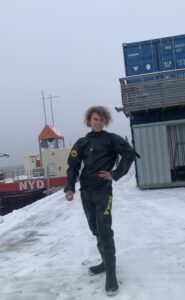
©Andreas Pietzcker
Before we could start diving we had to pass a medical check, fitness tests and a chamber dive to 50 meters to test our nitrogen tolerance. Breathing nitrogen at high pressures leads to the so called Nitrogen Narcosis or „Rapture of the Deep“. Usually the symptons set in at 30m and feel a bit like being drunk. The narcosis gets stronger the deeper you go (divers call this the Martini effect), so naturally at 50 meters we were in quite a cheerful mood. The air felt viscous due to the high pressure, you felt the high breathing resistance and most notably it changed your voice, making all of us sound like Donald Duck.
So naturally we sat in the cramped chamber bursting with laughter.
The first day of diving was filled with excitment. New equipment, check lists, for a few of us the first time they would ever get to experience the feeling of weightlessness underwater. I had been diving since I was twelve but this was a whole different world for me. Our equipment weighed in at around 30 kilos and we were glad when we climbed down the ladder into the water and could finally float.
Then we practized our bouyancy, an essential skill, to maintain a neutral position and neither sink nor ascent to the surface uncontrolled. We learned how to rescue an unconscious diver and bring him back safely, how to operate the winch to heave him out of the water and get him on a stretcher to perform first aid.
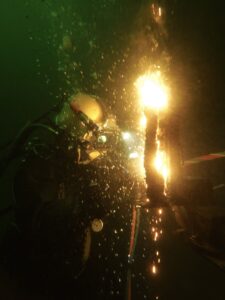
©Andreas Pietzcker
We were diving from Buldra, a dynamic positioning vessel (DPV) which uses it’s thrusters to maintain a fixed position in the water with pinpoint accuracy allowing divers to work safely. After a week of familiarizing ourselves with the equipment we took Buldra out to sea and dove from the wet bell. The wet bell uses the same principle as the first diving bells; it creates an air pocket within the bell with an open bottom, which allows divers to leave and return. In case of equipment failure the air pocket is our safe haven. During these dives we performed several inspection tasks on the bell, checking for example the electrical connections or the shakles used to attach the bell to the guide wires. The deepest dive with the wet bell was to 27m.
The next two weeks we learned about diving from the dry/closed bell and the transfer under pressure. The difference between the wet bell and the dry bell is, that on the dry bell we have a hatch which allows us to seal the bell on the bottom and maintain the bottom pressure while the bell is going up to the surface, whereas the wet bell’s pressure is always equal to the surrounding pressure.
The advantage is that the divers can be safely transferred under pressure (TUP) to a surface chamber, where they can decompress. The closed bell is used for deeper dives and saturation diving. On the station our worktask was to assemble different pipes using flanges to build a simulated distribution block for oil.
We learned about rigging and operating whinches. Underwater we guided them into place by making fine adjustments with a chain hoist and carefully positioning each part. We made sure the connection would not leak by using rubber gaskets and then screwed the pieces together using bolts. Especially important for making a good connection was the proper tightening of the bolts, where we did several passes tightening them little by little and always crosswise to make sure the pipes were properly connected.

©Andreas Pietzcker
Then we learned the use of lifting bags. Our goal was to lift a steel structure weighing about one metric ton. To figure out the weight we dove and took measurements of all the H-beams that make up the steel table. We worked out a total weight of nearly 950kg.
To prevent an uncontrolled ascent of the load we first rigged the table to a so called dead-mans-anchor. If we would fill the lifting bag to its total capacity the load would rise to the surface uncontrolled, where the bag would turn over, dump the air and come crashing down onto the divers. The dead mans anchor prevents this. This is just one example of the many things we learned about proper rigging, how to connect shackles and make sure they are loaded properly.
We filled the lifting bag and when we saw to table beginning to rise we could lift it with our bare hands and move it along the seabed.
We were also working on the pillars that make up the pier. We constructed a wooden frame underwater to be able to pour concrete. For the frame we cut 2×4 wood pieces into the correct length and profile of the bottom. To install rebar we used a pneumatic rock hammer drill to drill into the granite seabed. One diver operated the drill and the other diver guided the tip of the drillbit using a so called “Sea mans wife”. The drill we used uses around 60 liters of air per second. Which meant a whole lot of bubbles for us which made it rather difficult to see where we were drilling.
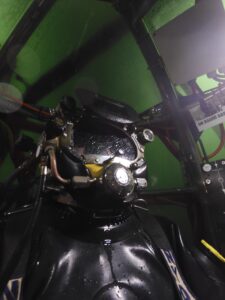
© Andreas Pietzcker
We learned how to use the AH3 and AH5 (air hat) free flow helmets. Their design is based on the old diving helmets like the Siebe Gorman whose history stretches back over a century. The difference of a free flow helmet is that there is a constant supply of air to the diver instead of a demand system, where air is supplied only when the diver breathes.
The helmet is connected to the dry suit and excess air has to be dumped with a valve that can be operated by pushing it with the side of your head. Again we were working on the concrete pillars, excavating and cleaning away the surrounding seabed to expose the bedrock. For cleaning we used an air lift which sucks away material using a difference in pressure and high and low pressure water jets as well as shovels to move material.
At around 15m there was an old steel tank which had been encrusted with barnacles and other types of sea life. We cleaned the tank using a hydraulic brush and got it nice and shiny again. As you would have expected of a group of guys, while we cleaned the surface we used parts of it for our own artistic expression.
We continued with deep dives up to 50 meters which also is the maximum depth a diver can work at breathing air because of the toxic effects of nitrogen and oxygen at these high pressures. We also did surface decompression. After deep and long dives the body builds up nitrogen which has to be released slowly or bubbles form in the divers blood which can have fatal consequences. To avoid this divers do decompression stops, which can be impractical because of long times in freezing water or waves. Surface Decompression works by lifting the diver quickly out of the water and recompressing them to a depth of 15m where they start breathing pure oxygen. To avoid bubbles from forming this has to happen quickly, within five minutes.
One of the most exciting things to learn about was underwater wet welding. Using specially made electrodes we practiced fillet welds and T-joints. Underwater welding is very different from welding on land, because the weld cools extremely quickly and has a tendency to crack if one works to fast. After joining a lot of steel plates together it was time to take them apart again by oxy-arc cutting. And electrode is ignited and supplied with a steady stream of oxygen which enables and exothermic reaction so that the tip of the electrode burns at around 5000 degrees celsius. This made short work of the steel plates which melted away like butter. It was an incredible experience to stand less than half a meter away from this bubbling and glowing metal next to a stream of smaller and sometimes larger explosions if a pocket of hydrogen gas had formed.
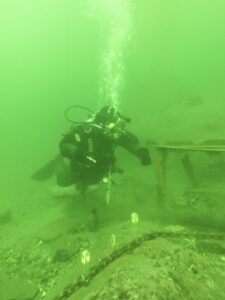
© Andreas Pietzcker
Lastly we trained on using Scuba gear and the Interspiro mask. This is the equipment used mostly by firemen and rescue divers and we practiced search patterns for lost objects (we had a chain and, of course, a gun), rescuing an unconscious diver, did inspection dives and cleaned the hull of the dive vessel Buldra, where we had started to dive all the way back in November.
It sounds crazy but diving into freezing water with equipment that weighs nearly as much as you do, is an amazing and fun experience. It is truly something extraordinary, the feeling of floating weightlessly in the water or walking with lead boots along the seabed like the astronauts on the moon.
Diving is a team effort and I was priviledged to work with some amazing, caring and professional individuals during this four month stay. We grew together as a group and took care of each other.
Every day there were new challenges and new things to learn and new experiences, so every morning I was glad to go there. And in the evenings we met, cooked and laughed together, watched movies, had barbeques or went out to Oslo to party.
There are so many different aspects to diving that it is hard to put into words but in essence it is a gateway to a truly unique world where adventures await. I will never forget the time I spent in Norway nor the lessons that I have learned and I am hoping that this will just be the beginning of an incredible journey. I want to thank Erasmus for giving me this opportunity and I will cherish these memories for a long time.
My Internship in Istanbul at Agaoglu Enerji
- Civil Engineering B.Sc.
- Turkey, Istanbul
- Agaoglu Enerji
- 10/2024 – 01/2025
Preparation
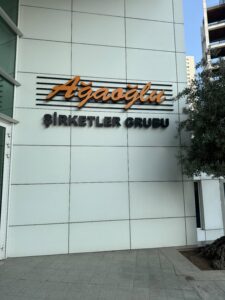
Logo of the Company ©Ebu Talip Osta
I had originally planned to spend a semester abroad in Istanbul. The idea of studying in this fascinating city for a while really appealed to me. However, after careful consideration, I decided to do an internship instead in order to gain practical experience in my field. I received support from my family in my search for a suitable company. Several companies that came into question were suggested to me and I began to investigate them more closely. It was particularly important to me that the company was active in the field of renewable energies and would provide me with valuable practical insights. After a lot of research, I finally chose Agaoglu Enerji. The company impressed me with its wind and solar energy projects and its innovative approach. Once I had made my decision, I was put in touch with the company and officially applied for the internship. After a successful application process, I was accepted and was able to start my internship in Istanbul.
Accommodation & living expenses
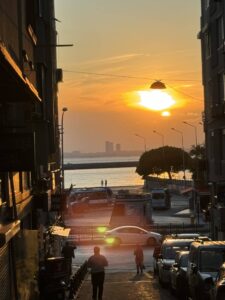
Kadiköy, Istanbul ©Ebu Talip Osta
I used Facebook groups, ESN WhatsApp groups and the Sahibinden app to find an apartment.What was important to me was a fixed-term tenancy agreement and the opportunity to view the apartment in advance. The location also had to offer good connections to work and leisure activities. In the end, I found an apartment in Kadıköy, a popular neighborhood for young people and students. The location was perfect – I had quick access to public transport and was able to spend my free time in a variety of ways. The cost of living in Istanbul is generally cheaper than in Germany, but varies depending on where you live and your lifestyle. While rents are higher in central districts, food, restaurants and public transport are comparatively inexpensive. Overall, I was able to live well and enjoy my time in Istanbul with a well-thought-out budget.
Everyday life / the internship
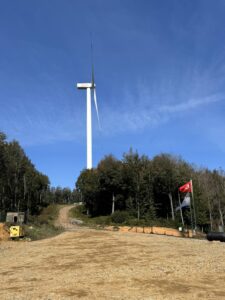
Wind turbine ©Ebu Talip Osta
My everyday life in Istanbul was an exciting mix of work and leisure. During the week, my day started early as I made my way to work at Agaoglu Enerji. Thanks to the good connections from Kadıköy, I got to the office quickly. My working days were varied – I dealt with project planning, data analysis and the technical implementation of wind and solar projects. The exchange with colleagues also played a major role and I was able to learn a lot from their experiences. I also took part in construction site visits to follow the progress on site.
After work, I used the time to explore the city or meet up with friends. Sometimes we went out to eat, had tea in one of the many cafés or walked along the Bosphorus. Some days I played soccer with my work colleagues, which was a great way to get to know the team better.
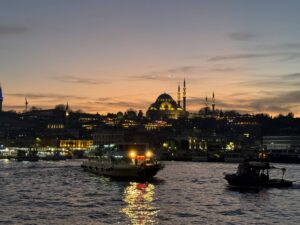
Bosphorus ©Ebu Talip Osta
At the weekend, I used the time to discover more of Istanbul. I visited famous sights, tasted the diverse Turkish cuisine and got carried away by the hustle and bustle of city life. I also stayed active in sports – sometimes I met up with friends to play soccer or for other leisure activities.
The mixture of professional experience and cultural adventures made my everyday life in Istanbul particularly exciting and enriching. Not only was I able to learn a lot of new things, but I was also able to enjoy life to the full in one of the world’s most fascinating metropolises.
Free time / Tipps
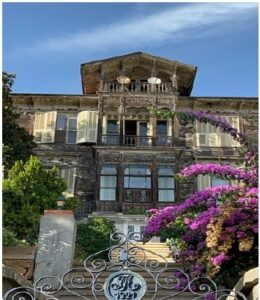
Princes Island ©Ebu Talip Osta
There are countless leisure activities in Istanbul that make the city an exciting experience. During my time there, I was in an ESN WhatsApp group that regularly offered current events and various trips to other cities. This was a great way to get out of the city and discover new places while keeping in touch with other Erasmus students.
A particular highlight is the ferry to Bursa. There you can explore the charming city and take the ropeway up to Uludağ, where you can not only enjoy a breathtaking view but also get some fresh mountain air.
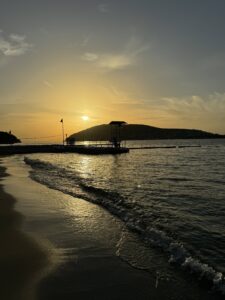
Princes Island ©Ebu Talip Osta
Destinations such as Eskisehir or Ankara, which you can easily reach by express train, are also ideal for a weekend trip.
You can also discover quiet places in Istanbul itself. With a slightly longer journey by train and bus, you can reach beautiful forests and beaches that are ideal for escaping the hustle and bustle of the city and relaxing in nature. The princes islands, which you can reach by ferry, are also highly recommended. They are a perfect destination, especially in summer weather – you can explore the islands and go swimming there to enjoy the sun and the sea.
Conclusion
The internship at Agaoglu Enerji was a very valuable experience that not only benefited me professionally, but also personally. I was able to apply my theoretical knowledge from my studies and at the same time gain new insights into the practical implementation of wind and solar projects. The close collaboration with experts and the opportunity to work on real projects was particularly exciting.
Living in Istanbul was also an unforgettable experience. The city is full of life, history and culture and offers countless opportunities to discover new things. Despite the initial chaos, I quickly got used to life there and really enjoyed the diversity of the city.
Both the professional and cultural experiences will leave a lasting impression on me and
are a valuable asset for my future academic and professional career.
My practical year in Montpellier
- Medicine
- France, Montpellier
- Centre Hospitalier Universitaire (CHU) de Montpellier
- 07/2024 – 10/2024
1. Application/Finding an Internship
From an early stage, it was clear to me that I wanted to complete a substantial part of my practical year, my medical internship, abroad. After planning my first rotation in Dubai and having my second in Germany, I wanted to see and experience something different for my third rotation. I chose to take another challenge: general surgery in Montpellier, Southern France. The application process was relatively straightforward; I sent an email to the head of the department in early 2024, and my application was quickly accepted. Further organization was handled through the universities in France and Germany. The process in France was similar to that in Germany, requiring vaccination records, certain health tests, and proof of insurance. Thanks to EU agreements, I didn’t have to worry about obtaining a visa.
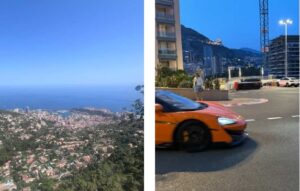
Monaco (left) and the Fairmont Hairpin Curve (right) ©Julia-Laura Schulz
Further planning included my travel arrangements and accommodation. I combined my journey with my family as a little road trip through Switzerland, Italy, and Monaco. For accommodation, I recommend student dormitories, but it is important to note that not all of them accept short-term stays, especially those that span multiple semesters. While I found it easy to secure accommodation for the semester holidays at the start of my internship, I had to move at the beginning of the new semester. Finding new accommodation was quite stressful and not easy, given my work routine and studies. However, in the end, everything worked out.
2. Accommodation & Living Expenses
During my internship, I opted for student housing, which offered a more affordable living option compared to private apartments. The costs for living in Montpellier were manageable, especially considering the financial support I received. I found that groceries were reasonably priced, but dining out could become expensive.
The student dormitories offered essential amenities, such as kitchen facilities, allowing me to cook my own meals, which helped keep my expenses down. While I didn’t strictly budget, I was mindful of my spending since I also wanted to indulge in the local cuisine and travel during my free time. Overall, Montpellier is a vibrant city, and the cost of living was reasonable for a student lifestyle.
3. Everyday Life/The Internship
On the first day of my internship, I registered at the medical faculty next to the hospital, where I enrolled alongside other Erasmus students. I then went directly to the General, Visceral, and Transplant Surgery department, known as “Chirurgie B.” The senior physician responsible for externes showed me around the unit and explained the processes. In France, medical students are referred to as “externes,” while resident doctors are called “internes,” which can be confusing at first, as “interns” in English usually refers to final-year medical students. Our team typically consisted of three German and two French students. The French externes usually rotate every few weeks, which allowed me to meet many different people.
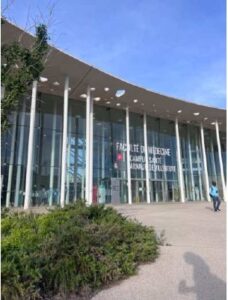
Faculty of Medicine ©Julia-Laura Schulz
Each week, we were assigned to a department, which could include the ward, the operating room, or outpatient clinics. Depending on our interests, we also had the opportunity to rotate through radiology, endoscopy, and anesthesia. Additionally, we had one to two on-call shifts each week (including weekends) for liver transplants. A typical day began with the morning handover from the night shift and a round of visits to all patients on both the general and intensive care wards. After the handover, everyone focused on their own tasks. Once a week, usually on Fridays, there were classes for students, often in the form of OSCE exercises. These sessions were highly educational, although the language barrier sometimes created a tense, exam-like environment. After the classes, the entire team would gather to review and discuss the surgical schedule for the upcoming week, deliberating on various cases. During these discussions, both attending and senior physicians often posed questions to both internes and externes. Additionally, once a month, the internes gave presentations, which were followed by the big weekly rounds.
The general ward was structured similarly to those in Germany, consisting of double and single rooms. The intensive care unit primarily had single rooms, and the operating rooms were comparably designed. Access to various areas of the hospital was secured with access codes. Both internes and externes had a dedicated room on the ward equipped with computers and lockers. All externes received a personal account for the duration of their stay to access computers and the hospital information system.
A particular highlight in Chirurgie B were the liver transplants. During the 24-hour on-call shifts, the ones on-call were responsible for these procedures and had to be prepared to stand in the operating room for about eight hours straight. There was also the opportunity to voluntarily participate in organ retrieval, which often involved traveling to different locations or even flying by private jet. On one occasion, we were escorted by the police, which felt like a movie and was incredibly exciting. The retrieval process is very moving and deeply impressive, as it represents the final and selfless act of brain-dead patients. After retrieval, the liver is transported in a cooled state and appears gray; however, after several hours of surgery and restoration of blood flow, it regains its dark red color. This moment is magical and makes all worries, back pain, and fatigue fade away.
One challenging aspect was the work environment in the department. There was often a tense atmosphere among the resident doctors, which sometimes affected us externes. This led to conflicts between internes and externes, causing misunderstandings with the attending physicians and resulting in stricter oversight. However, thanks to the camaraderie among the externes, this was manageable.
I also wanted to gain insight into neurosurgery, so I contacted the chief physician, who invited me to observe a particularly interesting procedure: an awake brain surgery. The patient underwent head surgery and was awakened for about an hour during the procedure with the assistance of neuropsychologists, who guided her to perform various tasks in order to minimize the risks associated with the surgery. Since I have a strong interest in neurosurgery, this was definitely one of my personal highlights at the clinic.
Despite the initial language barrier and different dialects, I quickly settled in and was able to learn a lot. I observed procedures that I had only previously studied in theory. The awake surgery and the liver transplants were undoubtedly extraordinary experiences that left a lasting impression on me. I would like to extend a special thank you to my colleagues, whose support made the stress of the internship much more bearable. Moreover, the opportunity to forge international connections and broaden my horizons was particularly valuable.
4. Free Time/Tips
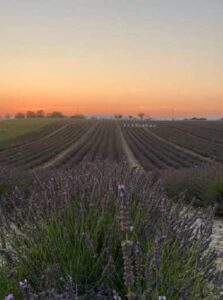
Lavender Fields, Provence ©Julia-Laura Schulz
From the beginning, I met many nice people. After work, we often arranged to meet for dinner, take weekend trips, go canoeing, or even play mini-golf together. A particularly memorable trip was to the lavender fields in Provence, which were breathtakingly beautiful. Watching the Euro football matches together was another unforgettable experience 4 especially the public viewing when France was playing, which created an incredible, lively atmosphere. We also went on trips with the Erasmus group, including horse riding in the Camargue, which was a unique way to explore the region. Numerous wonderful moments were created, and I have many pictures that I enjoy looking at repeatedly.
To pursue my passion for golf, I joined a golf club in Montpellier, where I regularly participated in courses. I met many other golfers, but since this was my last internship rotation, I also had to study for the third state exam, which meant sacrificing some of my free time. During this time, I discovered the university libraries, which I also liked.
The location of Montpellier allowed me to take many trips across Southern Europe. For example, I was able to meet friends in Barcelona or pick up my cousin from her language course in Nice. A particular highlight was our family reunion in Venice for my mother’s birthday, where family members from the USA, the Dominican Republic, and Germany came together. It was wonderful to see the surprised faces of my relatives when they saw us there.
Another delightful moment was when friends from Germany visited me, and we spent a wonderful week together. We explored the city, enjoyed the local cuisine, and shared many unforgettable moments.
On Sundays, I attended mass at various Catholic churches around the city, including the cathedral. Following the mass in French wasn9t always easy, but reading the liturgy beforehand in both German and French helped me follow along more easily and gain more from the sermon.
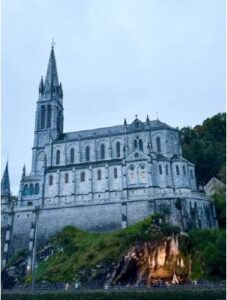
Lourdes ©Julia-Laura Schulz
For my return journey, my family picked me up, and we drove back via Lourdes and Paris. The Rosary procession and the water ritual formed a meaningful and memorable conclusion to my internship.
5. Conclusion
In conclusion, I can confidently say that the last rotation of my internship abroad was a complete success. I learned not only a lot professionally and linguistically but also gained numerous experiences, impressions, and valuable contacts. Montpellier taught me so much, and this experience will stay with me forever. Therefore, I would like to sincerely thank the Erasmus+ internship program for their support, which, along with my family’s assistance, made this stay possible. If you have any further questions, I am happy to help. Thank you!

